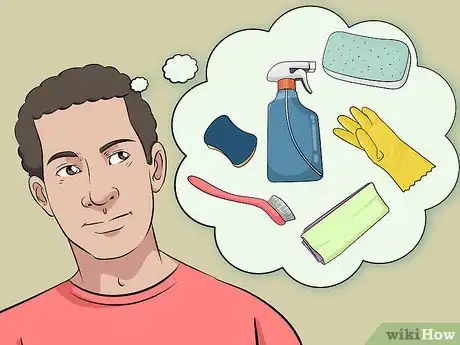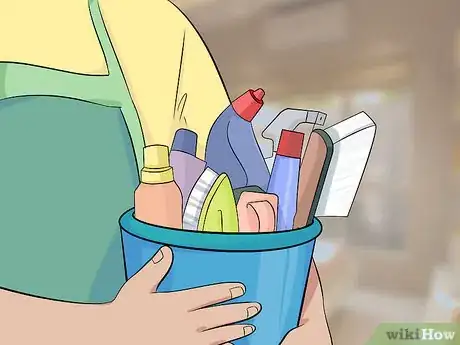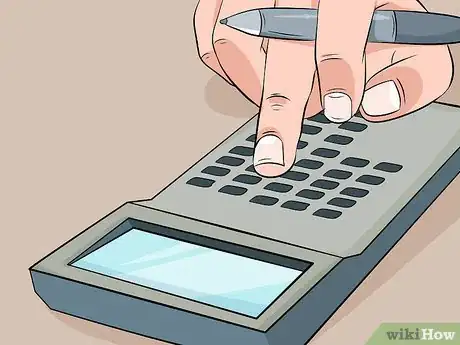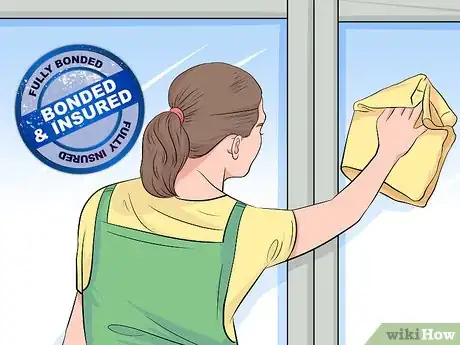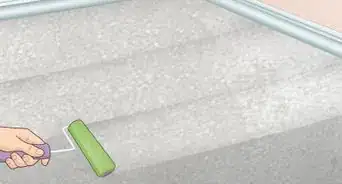This article was co-authored by wikiHow Staff. Our trained team of editors and researchers validate articles for accuracy and comprehensiveness. wikiHow's Content Management Team carefully monitors the work from our editorial staff to ensure that each article is backed by trusted research and meets our high quality standards.
wikiHow marks an article as reader-approved once it receives enough positive feedback. In this case, 95% of readers who voted found the article helpful, earning it our reader-approved status.
This article has been viewed 113,789 times.
Learn more...
Cleaning your house can be a time-consuming process that may be difficult to fit into your schedule. If your financial situation allows you to hire a cleaning service, this option can save you time and leave you with a sparkling home. There are likely several cleaning services in your area. Choosing and hiring the right one requires you to be aware of your own needs and to do some research on various services’ reputations and specialities.
Steps
Evaluating Your Needs
-
1Decide what you want cleaned. You may only choose to have the service tackle particularly tough spots in your home, such as the kitchen and main bathroom. Some families will want the house cleaned from top to bottom. You’ll also need to decide whether you expect services that may go beyond standard cleanings, such as wiping down the baseboards or washing the windows.[1]
- Many services will not clean windows, as they don’t want to create streaks or damage. You may need to turn to a professional for this.
- You may be able to choose different packages depending on the cleaning you need. If you get a standard cleaning, you can expect them to dust, wipe everything down, vacuum, and arrange your home. However, you wouldn't expect the person to clean the inside of the appliances or the nooks and crannies unless you requested a deep cleaning.
- You can also hire a cleaner for a move-in or move-out, which is similar to a deep cleaning, but it's tailored to someone who's preparing a property to move into or for a landlord review.
-
2Estimate how long it will take to clean your house. Most cleaning services will ask you how big your house is, how many bedrooms and bathrooms it contains, and what kind of routine cleaning you usually do. One bedroom and one bathroom usually takes about two and a half hours to clean, and kitchens take another 1-2 hours. If you haven’t cleaned in a while, these numbers may go up. Preparing this information for the service will help you both decide what you can afford.[2]Advertisement
-
3Decide how often you want your service to clean. Depending on your family’s needs, you may only need the service to come once or twice a month. If you have a bigger budget and a busier schedule, you might opt for more frequent visits. You can also create an alternating weekly schedule that directs the cleaners to clean different rooms every other time they visit.[3]
-
4Buy your own cleaning supplies if you have a preference. Because they’re more expensive, most cleaners will not clean with natural cleaning solutions. If you don’t want chemical cleaners used in your home, or if you have special cleaners you prefer, you’ll likely need to provide these to the service.[4]
- You may be able to negotiate a lower fee with the service if you provide your own cleaners. Ask potential services if they’d be willing to have this conversation with you.
-
5Define your budget. Before you start calling potential cleaning services, examine your finances. Make sure you know exactly how much you’re able and willing to pay companies. This will help you say no to companies that are out of your price range while also allowing you to make informed decisions about which services you can afford.
Picking a Service
-
1Choose a cleaning service for better legal protection. When you hire a cleaning company rather than an individual, the company takes responsibility for running background checks on its employees, providing worker’s compensation, and dealing with insurance issues. This option is generally better for families who may not have the time and legal knowledge to protect themselves from conflicts with individual employees.[5]
- It’s a good idea to ask potential cleaning services whether they’ve performed background checks on their employees. Reputable companies will certainly have performed these checks on any new hires.
- Cleaning companies may charge more than individuals, but the legal peace of mind they provide will likely be worth the extra cost.
-
2Choose a company that’s bonded and insured. Reputable services will have a policy that covers damage to your home incurred during the cleaning process, as well as missing or broken items. This can allow both you and the company to feel protected while cleaners are in your home. It is, however, a good idea to inform cleaners of items that may be more delicate or need special care.[6]
- If the cleaner is insured and they accidentally break something in your home, the insurance will cover the cost.
-
3Reach out to your family and friends for referrals. People who are close to you will know what you need, and they’ll be ready to provide you with honest advice about their past experience with various cleaners. Be sure to tell those who you ask for advice that you plan to hire a reputable service with an insurance policy, as this may affect the options they give you.[7]
-
4Read online reviews if they’re available. Most cleaning services will have many reviews online for you to view, particularly if the company is large and has been in business for several years. Read a wide range of reviews. Some companies may receive just a few scathing reports from one disgruntled customer, but will otherwise have a series of five-star ratings.[8]
- Reading reviews and testimonials allows you to see what previous clients thought of the service they received. One thing to check for is whether the company is punctual, or at least whether they call to let their clients know if they'll be running late.
- Try checking with agencies like Amazon Home Cleaning Services, Handy, and Task Rabbit. They've already done background checks and vetted the cleaning providers to make sure they have insurance and that all of them are offering quality services. You can also check Google and Yelp to compare the reviews and testimonies for different local cleaning services.
-
5Ask the service for references if there aren’t online reviews. If a company is new to your area or smaller in scale, they may not yet have an online presence. You can ask these companies for a list of referrals from their previous clients. When you call these clients, be sure to ask what kind of cleaning the company performs for them, and whether the client still employs the service.[9]
-
6Ask potential companies what they clean and charge. Most companies will have a list of the typical types of cleaning they perform. They’ll also inform you whether they charge a flat rate for each cleaning, an hourly fee, or a room-by-room charge. Be sure you understand what’s included in the company’s base cleaning rate, and what’s not. Ask questions about any cleaning activities the company doesn’t explicitly mention.[10]
- If your company charges an hourly fee, you can put a cap on the amount of hours the service is allowed to clean to ensure that your cost doesn’t get out of control. Note that this may prevent your house from receiving a complete cleaning, especially on the first visit.
-
7Ask about extra charges for add-ons. Once you understand the company’s list of what it typically cleans, ask if they ever perform cleaning services not on that list. Be sure to then ask how much these extra services cost. If there’s something you want cleaned in your home that the service hasn’t mentioned, ask how much it would add to their overall fee.[11]
- Asking for a detailed checklist of what the cleaning will include ensures there won't be any surprises when the cleaner arrives.
-
8Ask what cleaning solutions the company uses for various surfaces. You’ll want to be aware of which cleaning solutions the service is using in your home. This is especially important if you have pets or children, and you’re concerned about minimizing their exposure to certain chemicals. If you have a special countertop or sensitive surface in your home, you should also ask the company if they have the appropriate solutions for those materials.[12]
-
9Ask for a trial cleaning of your home. See if the company would be willing to see if the relationship works by having a trial session. They may be willing to provide a satisfaction guarantee that waives the fee if you don’t approve of the cleaning your home receives. Once you’ve completed this trial, you’ll likely be able to feel more confident about spending your money on the cleaning service.
Working with Your Cleaners
-
1Sign a written contract laying out your and the company’s terms. It’s a good idea to sign a document stating the company’s fees, both of your expectations for what will be cleaned along with any added services, and what’s defined as damage caused by the cleaners. Having a record of this agreement should help avoid future confusion or disagreement over how much the company is owed.[13]
-
2Follow the company’s policy on staying in or leaving the home. Some companies may ask you to remain in the house while your cleaners are present. This policy may be used as a method of protecting the company if something goes missing from your home. Other companies may not have a preference, and you may want to use the time to do something outside the house.[14]
- If you're home during the cleaning, stay out of the way. Cleaners can get anxious or frustrated when a client is following their every footstep. Just remember that they're experts and professionals, and they're doing what you hired them to do.
-
3Discuss the company’s policy on pets. Some companies may ask that you either take your pet out of the house or confine them to a specific area. Others may ask that you introduce the cleaners to the pet to ensure that they’re familiar with each other before you leave them alone with the animals. If your pet doesn’t generally like strangers, you may want to stay in the house with them the first few times the cleaner visits.[15]
-
4Ensure that your cleaner has access to your home. If you aren’t going to be at home when the cleaner visits, you may need to provide them with a key, code, or garage door opener to let them into the home. You can include a clause in your written agreement with the company about safely providing these items to your cleaners without worrying that they’ll be copied or shared.[16]
-
5Do an initial walk-through with your cleaner. This meeting will let you familiarize the cleaner with the space. You should point out broken appliances or damage in your home that they might need to avoid. This is also a good time to show them any areas that will need special attention or extra cleaning.[17]
- You can show them children’s rooms that get especially untidy. Or if, for example, you have a china cabinet filled with breakable items that you’d like to dust on your own, be sure the cleaner is aware of this.
-
6Clarify your expectations to prevent confusion. Be sure that the cleaner the service sends is aware of your expectations. This will ensure that you, the company, and the employee are all on the same page. Especially if you have a specialized agreement with the company, this will avoid any frustration over areas that go uncleaned or unexplained charges for areas that you planned to clean yourself.[18]
- Establish arrival times with your cleaner, such as whether they'll arrive at a specific time or within a certain window."
-
7Tidy your house if you want the cleaner to focus on deep cleaning. It’s a good idea to deal with general clutter on your own before the cleaners arrive. While cleaners will pick up and fold clothes left on the floor or put toys back in their designated area, this will take up their time and energy. This could mean that your house won’t receive the deep clean it needs.[19]
- If you’re paying an hourly fee, it’s especially important that you pick up your own clutter.
-
8Provide courteous feedback after the first few visits. You may have questions or suggestions after the first few times your cleaner comes. Discuss any areas of the home you’d like cleaned slightly differently. Be sure to treat your cleaner as a professional who deserves both kindness and respect from you.[20]
- If you’re unsatisfied with the service, call the company directly. You can explain in detail exactly why you feel something isn’t meeting your expectations. You’ll likely be able to work out a more clear agreement with the company, which will be easier than starting over the process of finding a new service.
-
9Tip 10-20% to show your satisfaction with the cleaner. As with most service-based industries, cleaners depend on tips. Check on your company’s policy, as they may roll tips into their overall fee and disperse them individually in paychecks. If not, it’s expected that you’ll show your appreciation of the service by tipping the cleaner directly.[21]
- While there's no requirement or expectation for tipping, it's a nice way to let the cleaner know they did a good job.
References
- ↑ http://www.huffingtonpost.com/2014/08/14/home-cleaning-services-what-to-know_n_5660048.html
- ↑ http://www.huffingtonpost.com/2014/08/14/home-cleaning-services-what-to-know_n_5660048.html
- ↑ http://www.denverpost.com/2014/04/11/what-you-need-to-know-about-hiring-a-housekeeper/
- ↑ https://www.brickunderground.com/blog/2015/04/hiring_a_house_cleaner_for_the_first_time_your_etiquette_questions_answered
- ↑ https://www.angieslist.com/articles/11-questions-ask-house-cleaning-services.htm
- ↑ https://www.angieslist.com/articles/11-questions-ask-house-cleaning-services.htm
- ↑ http://www.quickanddirtytips.com/house-home/housekeeping/6-tips-for-hiring-a-house-cleaner
- ↑ http://www.quickanddirtytips.com/house-home/housekeeping/6-tips-for-hiring-a-house-cleaner
- ↑ http://www.quickanddirtytips.com/house-home/housekeeping/6-tips-for-hiring-a-house-cleaner?page=1
- ↑ https://www.brickunderground.com/blog/2015/04/hiring_a_house_cleaner_for_the_first_time_your_etiquette_questions_answered
- ↑ https://www.angieslist.com/articles/11-questions-ask-house-cleaning-services.htm
- ↑ https://www.brickunderground.com/blog/2015/04/hiring_a_house_cleaner_for_the_first_time_your_etiquette_questions_answered
- ↑ https://www.angieslist.com/articles/11-questions-ask-house-cleaning-services.htm
- ↑ https://www.brickunderground.com/blog/2015/04/hiring_a_house_cleaner_for_the_first_time_your_etiquette_questions_answered
- ↑ https://www.brickunderground.com/blog/2015/04/hiring_a_house_cleaner_for_the_first_time_your_etiquette_questions_answered
- ↑ https://www.angieslist.com/articles/11-questions-ask-house-cleaning-services.htm
- ↑ http://www.denverpost.com/2014/04/11/what-you-need-to-know-about-hiring-a-housekeeper/
- ↑ http://www.quickanddirtytips.com/house-home/housekeeping/6-tips-for-hiring-a-house-cleaner?page=1
- ↑ http://www.huffingtonpost.com/2014/08/14/home-cleaning-services-what-to-know_n_5660048.html
- ↑ http://www.quickanddirtytips.com/house-home/housekeeping/6-tips-for-hiring-a-house-cleaner?page=1
- ↑ https://www.brickunderground.com/blog/2015/04/hiring_a_house_cleaner_for_the_first_time_your_etiquette_questions_answered


